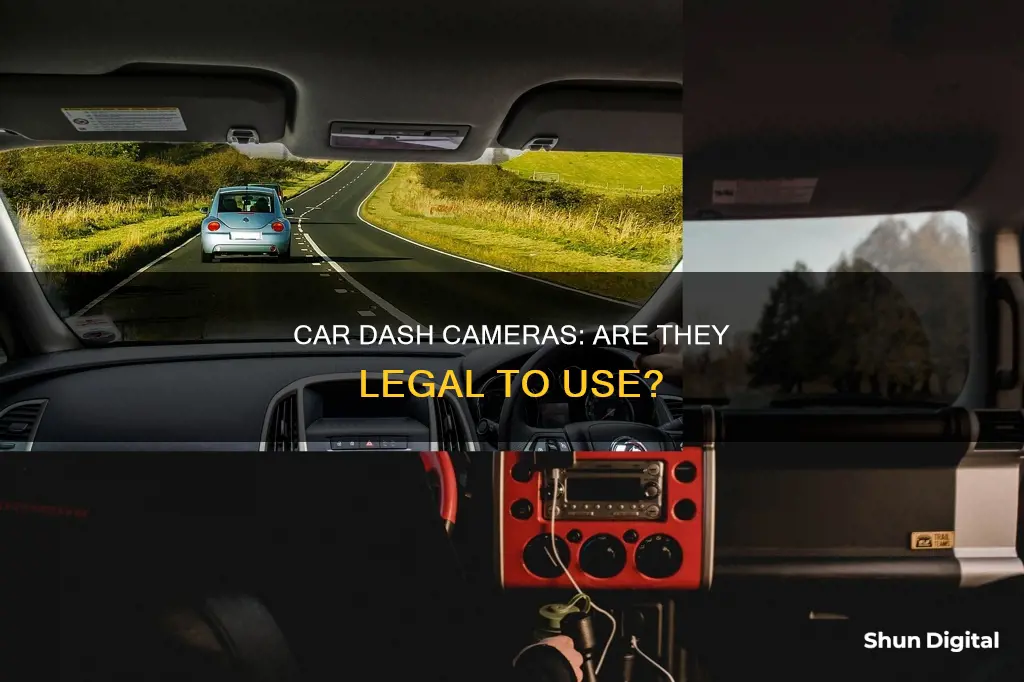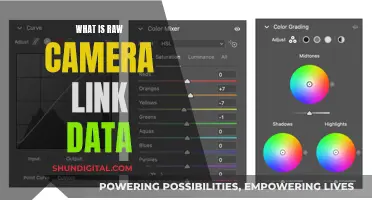
Dash cams are legal in all US states, but there are different laws in each state regarding their installation and use. In most states, you cannot mount a dash cam on the windscreen, but all states permit a dash cam to be installed on the dashboard, as long as it does not obstruct the driver's view. Some states also have laws regarding the consent of passengers to be recorded, particularly when it comes to audio recordings.
| Characteristics | Values |
|---|---|
| Legality in the US | Legal in all 50 states |
| Legality by state | Varies by state |
| Installation restrictions | Varies by state |
| Privacy laws | Varies by state |
| Wiretapping laws | Varies by state |
| Surveillance laws | Varies by state |
| Recording without consent | Varies by state |
| Recording audio | Varies by state |
| Recording police | Varies by state |
| Windshield obstruction laws | Varies by state |
| Airbag obstruction laws | Varies by state |
| Distracted driving laws | Varies by state |
What You'll Learn

Legality of dash cams in the US
Dash cams are not illegal in the US. There are no federal laws outlawing the use of dash cams. However, there are federal laws regarding surreptitious audio recordings, which could make it illegal to record a conversation in your vehicle without the knowledge of all participants.
While dash cams are not illegal, many states have restrictions in place that could impact how and where you install your dash cam. Some states have stipulations surrounding those that record audio, too.
Obstructed View
The first issue with dash cams is where to put them. Most cameras don't attach to your vehicle's dashboard. Instead, they use a suction cup mounting system to adhere to the windshield. This is important because many states have restrictions on how much of a windshield can be obscured by devices like cameras and GPS systems.
If a device obscures more than a 5-inch square on the driver's side or a 7-inch square on the passenger's side, you could be pulled over. However, some states have tighter restrictions than others, and others have no restrictions at all. So, it's important to check the specific laws or municipal codes in your area.
The following states prohibit windshield-mounted dash cams:
- Alabama
- Arkansas
- Connecticut
- Delaware
- Florida
- Georgia
- Idaho
- Iowa
- Kansas
- Kentucky
- Louisiana
- Massachusetts
- Michigan
- Mississippi
- Montana
- Nebraska
- New Hampshire
- New Jersey
- Maine
- New Mexico
- New York
- North Dakota
- Ohio
- Oklahoma
- Oregon
- Pennsylvania
- Rhode Island
- South Carolina
- South Dakota
- Tennessee
- Texas
- Virginia
- Washington
- West Virginia
- Wyoming
The following states have placed some restrictions on mounting a camera on the windshield:
- Alaska
- Arizona
- California
- Colorado
- Hawaii
- Illinois
- Indiana
- Maryland
- Minnesota
- Nevada
- Utah
- Vermont
- Wisconsin
Electronic Surveillance
As dash cams are a form of surveillance, you may also need to consider electronic surveillance laws in your state. There may be data protection laws in place, and you may need to obtain permission from all passengers to record audio in the car.
Traffic Camera Tickets: To Pay or Not to Pay?
You may want to see also

Legality of dash cam installation
The legality of dash cam installation varies from state to state in the US. While dash cams are legal in all 50 states, there are specific regulations in some states regarding their installation and use.
In most states, dash cams are not permitted on the vehicle's windscreen, but all states permit dash cams to be installed on the dashboard, as long as they do not obstruct the driver's view. In some states, there are size restrictions for dash cams, and they must be smaller than 5 or 7 inches, depending on which side of the vehicle they are mounted. For example, in Alaska, Arizona, and Illinois, dash cams must be smaller than 5 square inches if installed on the driver's side.
Some states have laws regarding audio recording and consent. Twelve states require both parties to consent to audio recording, while in 38 states, only one party needs to consent. In some states, such as Florida, Michigan, and Ohio, it is illegal to record audio without the prior permission of the person being recorded.
It is important to note that laws and regulations may change, so it is recommended to check the current laws in your specific state before installing a dash cam.
Best Non-Chinese 4K Cameras for Your M1 Mac
You may want to see also

Legality of dash cam placement
The legality of dash cam placement varies depending on the state or jurisdiction. While dash cams are generally legal, there are specific regulations in some states regarding their placement.
In most states, the placement of dash cams is restricted by laws relating to obstructed views. In many jurisdictions, there are restrictions on how much of a windshield can be obscured by devices such as GPS navigation units and dashboard cameras. The rule of thumb is that if a dash camera obscures more than a 5-inch square on the driver's side or a 7-inch square on the passenger's side, it is considered an obstruction. However, some areas have even tighter restrictions, while others have no restrictions at all.
In addition to restrictions on windshield obstructions, some states have specific regulations governing the placement of dash cams. For example, in California, dash cams are exempt from the law prohibiting objects hanging on the windshield, but they must be mounted within a specific area, such as a seven-inch square in the lower corner of the windshield farthest removed from the driver. In Indiana, dash cams must be installed as a four-inch square in the bottom corner on the passenger side.
Another factor to consider when determining the legality of dash cam placement is electronic surveillance or privacy laws. Dashboard cameras are technically a form of surveillance, and there may be data protection laws in some areas that restrict their use. Additionally, there are federal laws regarding surreptitious audio recordings, which may make it illegal to use a dash cam to record a conversation without the knowledge of all participants. However, this can usually be avoided by disabling the audio recording functionality or by notifying passengers that they are being recorded.
Overall, the legality of dash cam placement depends on the specific laws and regulations of the state or jurisdiction in which the dash cam is being used. It is important for drivers to research the laws in their area before installing a dash cam to ensure that they are complying with all relevant regulations.
Adjusting Your Uokoo Camera: Tips for Optimal Focus
You may want to see also

Legality of dash cam audio recording
The legality of dash cam audio recording varies across the United States. While dash cams are legal in all 50 states, there are specific regulations in some states regarding audio recording.
Twelve states require both parties to consent to the audio recording. This means that both the driver and the passenger(s) must agree to the recording of any audio that may emanate from within the cabin of the car. These states include California, Connecticut, Florida, Illinois, Michigan, Montana, Maryland, New Hampshire, Massachusetts, Nevada, Washington, and Pennsylvania.
For the remaining 38 states, only the passenger needs to give consent. There are currently no regulations or requirements in Vermont.
In some states, it is illegal to record audio conversations without the consent of every person involved. In the context of dash cams, this means that the driver cannot record audio without getting permission from everyone in the vehicle.
In all other states, it is legal to record conversations as long as at least one person involved is aware and gives consent. This could be the driver, but they must inform their passengers that they are being recorded.
It is worth noting that dash cam footage can be used as evidence in court. If there is evidence of a crime and a police officer subpoenas dash cam footage, it must be provided. Refusal to comply or deletion of the footage could result in fines or jail time.
However, there must be evidence of a crime for law enforcement to insist on seeing the footage without a warrant. Police officers are also not allowed to ask to see dash cam footage after pulling a driver over.
Finding the Battery on Your Fujifilm Waterproof Camera
You may want to see also

Legality of dash cam video recording
Dash cams are legal in all US states. However, there are specific regulations that govern their installation and use, which vary from state to state.
Installation and Placement
In most states, you cannot install a dash cam on the windshield of your vehicle. All states permit dash cams to be installed on the dashboard. However, the camera must not obstruct the driver's view. In some states, there are size restrictions for dash cams. For example, in Alaska, dash cams must be smaller than five or seven inches, depending on which side of the vehicle they are mounted. In Texas, a dash cam must not take up more than five square inches on the driver's side or seven square inches on the passenger's side.
Surveillance and Privacy
In some states, there are regulations around whether you can record passengers without their consent, particularly when it comes to audio recordings. Twelve states require both parties to consent to the audio recording: California, Connecticut, Florida, Illinois, Michigan, Montana, Maryland, New Hampshire, Massachusetts, Nevada, Washington, and Pennsylvania. In the other 38 states, only one party needs to consent.
Border Crossings
At US border crossings, you need permission from Customs & Border Protection Officers to keep your dash cam on and filming.
Admissibility in Court
Dash cam footage can be used as evidence in court in most car accident cases.
Updating Camera Raw: Elements 14 Edition
You may want to see also
Frequently asked questions
Dash cams are legal in all US states. However, there are specific regulations in some states. For example, in California, dash cams may not be more than 7 square inches if mounted in the lower right-hand corner of the windshield.
There is generally no law dictating where you should place your dash cam, but its placement mustn't obstruct the driver's view or interfere with the airbag. Some states may have regulations regarding the use of devices that attach to the windscreen, so be sure to review local laws.
Audio recording laws differ from state to state. In some states, you can record audio without obtaining consent, but in others, it's illegal to do so without the consent of all parties.
Yes, dash cam footage can be used as evidence in court in the case of accidents or traffic violations. It can also be used to support insurance claims and help prove liability.







